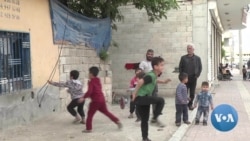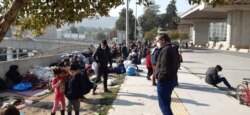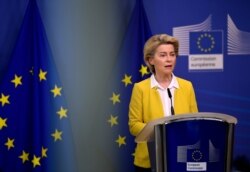The coronavirus pandemic has forced millions of Syrian refugees living in Turkey deeper into poverty, with many having to take on large debts to survive, according to research by the Turkish Red Crescent and the International Federation of Red Cross and Red Crescent Societies.
Turkey is host to almost 4 million refugees, the vast majority of them Syrians escaping the decadelong conflict back home. Most are not legally permitted to work but find informal jobs in sectors such as construction, agriculture or hospitality.
When the coronavirus pandemic hit, Turkey's lockdown measures closed off many of those jobs overnight, Jonathan Brass, Turkey operations manager for the International Federation of Red Cross, said in an interview with VOA.
"As a result, [it] limited people's ability to earn and then pay for the basic needs, whether it's water, health care, electricity. And as a result, the risk of falling into more difficult measures — whether it's going into debt, which is one of our main findings — was the outcome of that," Brass said.
The report's authors say debt levels among Syrian refugees in Turkey have increased by 50% in the last year, forcing them to adopt various survival strategies.
"The quality and the quantity and the types of food people were eating was being reduced because they have control over that. The utilities, people were going into arrears, and they were going into arrears with their bills for their housing," Brass told VOA.
The report warns that refugees' "resources and coping strategies have been exhausted, debt levels are rising, and if restrictions continue, the needs of refugees could increase dramatically."
The International Federation of Red Cross and Red Crescent Societies provides cash assistance to refugees in Turkey, using money from the European Union, which was agreed as part of the deal struck between Brussels and Ankara in 2016 to stem the flow of refugees into Europe.
The so-called Emergency Social Safety Net amounts to around $18 monthly per family member.
At a press conference June 25, EU Commission President Ursula von der Leyen pledged additional funding.
"We have already made clear that we will continue supporting Turkey and other partners in the region, like Jordan or Lebanon, which host millions of Syrian refugees," von der Leyen told reporters.
"It is now 10 years into the Syrian conflict, and the region still carries the lion's share of the burden. And it is in our collective European interest to protect the refugees and to support their host, mainly in these difficult times with COVID and very difficult economic times," she added.
"Therefore, we always show that we supported in the past and we plan to support in the future. We plan to allocate an additional 3 billion euros [$3.6 billion] to support refugees in Turkey until 2024. This money will come entirely from the EU budget," von der Leyen said.
Refugees in Turkey are able to access Turkey's coronavirus vaccination program.
Brass of the IFRC said there is optimism that the easing of lockdown measures will open up more opportunities for refugees to find other sources of income.
"As of June 1, we have seen an opening up of the country," Brass told VOA. "The rollout of the vaccines is a very important factor, and although refugees have full access to vaccines, to health care, there are all sorts of barriers which they face regarding language or regarding information about how to access those vaccines."
However, critics say Europe and the West must come up with a long-term solution for Syria's refugees, including faster resettlement programs to relieve the pressure on Turkey.











